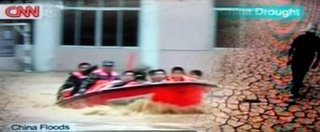
L'Est Republicain which reported his 'death'
There has been a surge of speculation as to the fate of America’s most wanted this weekend after the publication of an article in a French newspaper. The article published in L'Est Republicain reported that the head of al-Qaeda was dead. Usama bin Laden, Osama bin Laden or Oussama bin Laden [there is no definitive spelling of his name (أسامة بن لادن) in the west] had, according to the article, succumb to a water-born disease, namely typhoid. The paper cited “Usually reliable sources” which indicated the Saudi security services had spotted the militant Islamist leader in Pakistan on 23rd August 2006. The report went on to say that bin Laden was suffering “partial paralysis of his lower limbs” and that the situation was such that “medical care would be impossible”.
Confirmation of his death
However there is still uncertainty as to whether the fugitive is dead or alive. The “usually reliable source” said that the Saudi security services received a report of his death on the 4th September 2006, but were awaiting further details before announcing the death officially. The collected intelligence by the French Secret Service [DGSE] was, according to L’Est Republicain, reported to the highest French authorities. The US has refused to make any official comment on the reports, Condoleezza Rice saying only, “No comment, and no knowledge”. And the French Prime Minister, Jacques Chirac, was seemingly more incensed by the leak of information and called for an immediate inquiry. CNN could only add to the rumours and speculation by quoting an un-named Saudi security source which indicated that they were aware that bin Laden had a ‘water-born disease’ but could no say whether he had died. But the BBC reported the Saudi authorities as saying they had no evidence of the terrorist’s demise. "The Kingdom of Saudi Arabia has no evidence to support recent media reports that Osama Bin Laden is dead," the Saudi government said. And Pakistan's ambassador to the US, Mahmud Ali Durrani told BBC News 24 that he doubted the claims were true. "It would be very nice to confirm that he is dead - in Pakistan, Afghanistan, New York or wherever, but I think such claims are unsubstantiated." Whether or not Osama bin Laden is dead, the War on Terror continues, as does the ‘global jihadism’ which according to one report in the New York Times suggested that the War in Iraq had exacerbated. The report said, “The Iraq war has made the overall terrorism problem worse.” At least 9 died in the most recent bombings in Baghdad [CNN], and recent UN figures showed more than 6,000 had died in terror attacks in July and August. Coalition losses also continue to rise with total losses now hitting 2,937. Afghanistan fairs little better with increased attacks on coalition forces, civilians and Afghan officials. On Monday a top Afghan official was killed by gunmen [BBC] and last week 19 construction workers were killed in a bomb blast [BBC]. At least 35 coalition troops have died in September thus far, six more for the whole of August. It brings the total losses to 483 since 2001.














